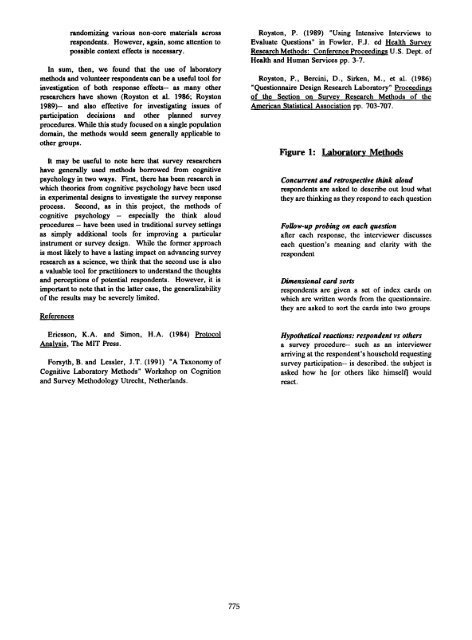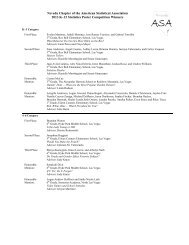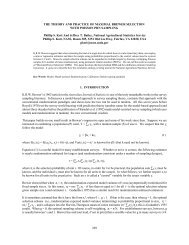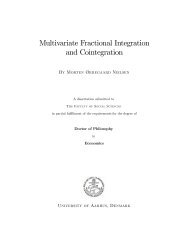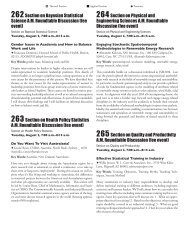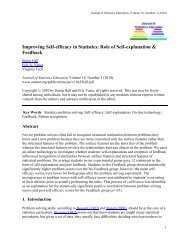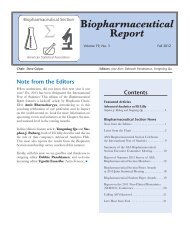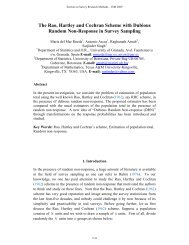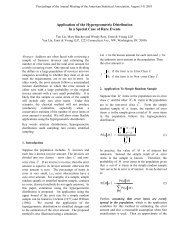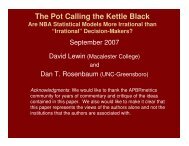Cognitive Assessment of Survey Instruments and Procedures for ...
Cognitive Assessment of Survey Instruments and Procedures for ...
Cognitive Assessment of Survey Instruments and Procedures for ...
Create successful ePaper yourself
Turn your PDF publications into a flip-book with our unique Google optimized e-Paper software.
<strong>and</strong>omizing various non-core materials across<br />
respondents. However, again, some attention to<br />
possible context effects is necessary.<br />
In sum, then, we found that the use <strong>of</strong> laboratory<br />
methods <strong>and</strong> volunteer respondents can be a useful tool <strong>for</strong><br />
investigation <strong>of</strong> both response effects- as many other<br />
researchers have shown (Royston et al. 1986; Royston<br />
1989)- <strong>and</strong> also effective <strong>for</strong> investigating issues <strong>of</strong><br />
participation decisions <strong>and</strong> other planned survey<br />
procedures. While this study focused on a single population<br />
domain, the methods would seem generally applicable to<br />
other groups.<br />
R may be useful to note here that survey researchers<br />
have generally used methods borrowed from cognitive<br />
psychology in two ways. First, there has been research in<br />
which theories from cognitive psychology have been used<br />
in experimental designs to investigate the survey response<br />
process. Second, as in this project, the methods <strong>of</strong><br />
cognitive psychology- especially the think aloud<br />
procedures- have been used in traditional survey settings<br />
as simply additional tools <strong>for</strong> improving a particular<br />
instrument or survey design. While the <strong>for</strong>mer approach<br />
is most likely to have a lasting impact on advancing survey<br />
research as a science, we think that the second use is also<br />
a valuable tool <strong>for</strong> practitioners to underst<strong>and</strong> the thoughts<br />
<strong>and</strong> perceptions <strong>of</strong> potential respondents. However, it is<br />
important to note that in the latter case, the generalizability<br />
<strong>of</strong> the results may be severely limited.<br />
References<br />
Ericsson, K.A. <strong>and</strong> Simon, H.A. (1984) Protocol<br />
Analysis, The MIT Press.<br />
Forsyth, B. <strong>and</strong> Lessler, J.T. (1991) "A Taxonomy <strong>of</strong><br />
<strong>Cognitive</strong> Laboratory Methods" Workshop on Cognition<br />
<strong>and</strong> <strong>Survey</strong> Methodology Utrecht, Netherl<strong>and</strong>s.<br />
Royston, P. (1989) "Using Intensive Interviews to<br />
Evaluate Questions" in Fowler, F.J. ed Health <strong>Survey</strong><br />
Research Methods: Conference Proceedings U.S. Dept. <strong>of</strong><br />
Health <strong>and</strong> Human Services pp. 3-7.<br />
Royston, P., Bercini, D., Sirken, M., et al. (1986)<br />
"Questionnaire Design Research Laboratory" Proceedings<br />
<strong>of</strong> th.e Section on <strong>Survey</strong> Research Methods <strong>of</strong> the<br />
American Statistical Association pp. 703-707.<br />
Figure 1: Laboratory Methods<br />
Concurrent <strong>and</strong> retrospective think aloud<br />
respondents are asked to describe out loud what<br />
they are thinking as they respond to each question<br />
Follow-up probing on each question<br />
aider each response, the interviewer discusses<br />
each question's meaning <strong>and</strong> clarity with the<br />
respondent<br />
Dimensional card sorts<br />
respondents are given a set <strong>of</strong> index cards on<br />
which are written words from the questionnaire.<br />
they are asked to sort the cards into two groups<br />
Hypothetical reactions: respondent vs others<br />
a survey procedure-- such as an interviewer<br />
arriving at the respondent's household requesting<br />
survey participation-- is described, the subject is<br />
asked how he [or others like himself] would<br />
react.<br />
775


